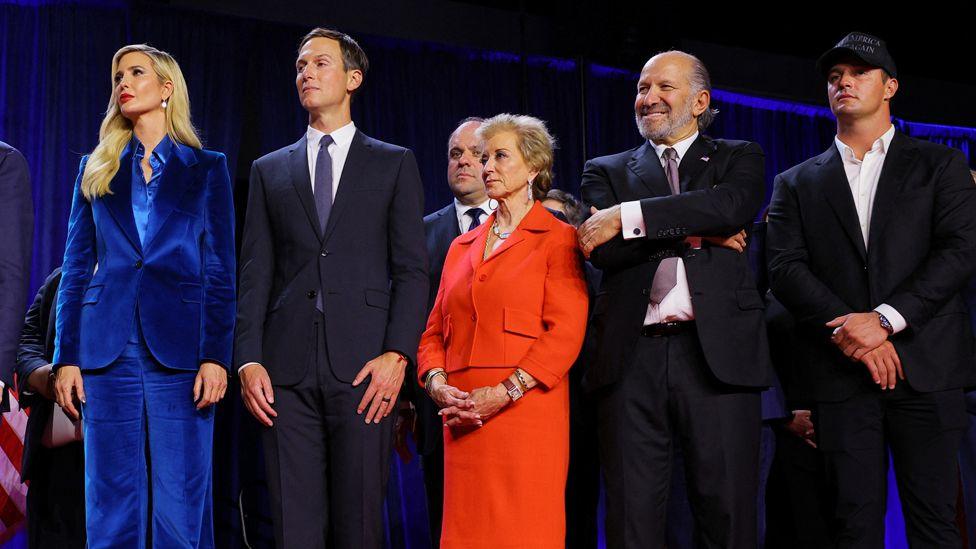Melania Trump, enigmatic first lady who might do it differently this time
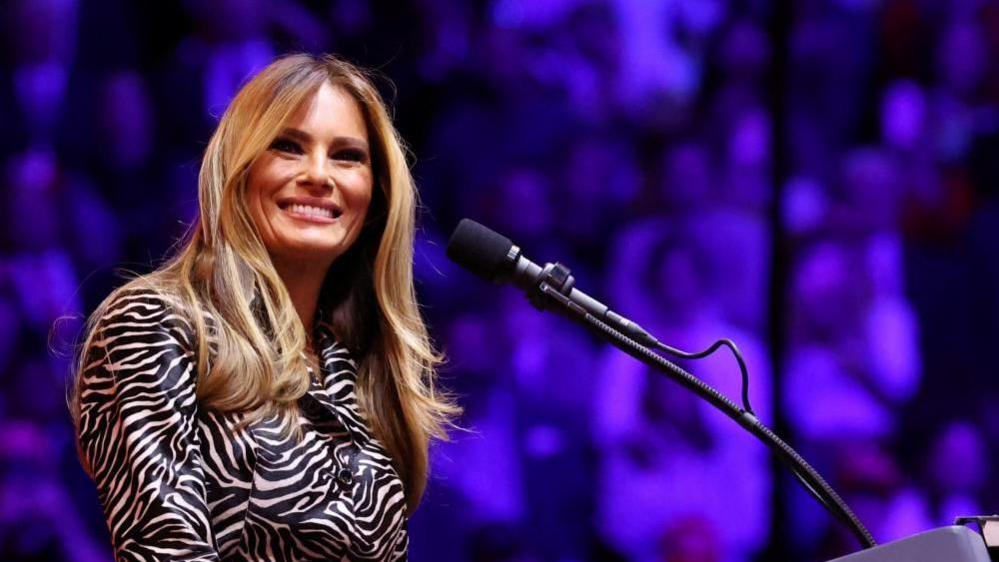
Melania Trump will be First Lady of the United States for the second time following her husband's win
- Published
A day after her husband’s big election night win, Melania Trump took to social media to address the nation.
“The majority of Americans have entrusted us with this important responsibility,” Mrs Trump said.
“We will safeguard the heart of the republic – freedom,” she vowed, and urged Americans to rise above ideology for the sake of the country.
It was a brief message, but suggested a shift in how the former first lady will approach the role this second time around.
When Trump won his first presidency in 2016, his wife was initially absent from the White House, instead staying in New York with their young son. She appeared reticent, at times, with the traditions set out by first ladies that preceded her.
But experts say that this time, Mrs Trump will likely be more deliberate with her approach to the largely undefined role of being America’s First Lady.
Born Melanija Knavs, the 54-year-old Slovenian-American former fashion model eventually traded a glamorous life in the gilded walls of Manhattan’s Trump Tower for the confines of political life that came with the Oval Office, during a presidency that was often mired in controversy.
Described by some as an “enigma”, Mrs Trump has preferred to be less public than her predecessors, giving fewer speeches both in the White House and on the campaign trail.
“She’s been unique among modern first ladies,” said Tammy Vigil, an associate professor of communications at Boston University and author of a book on Michelle Obama and Melania Trump.
“She does things the way she wants to do them, as opposed to the way she has to do them. But she fulfils the base expectations.”
In recent years, she avoided the spotlight as her husband challenged several legal cases against him while he campaigned for a second term.
Her absence inspired several news articles this summer asking: “Where is Melania?”
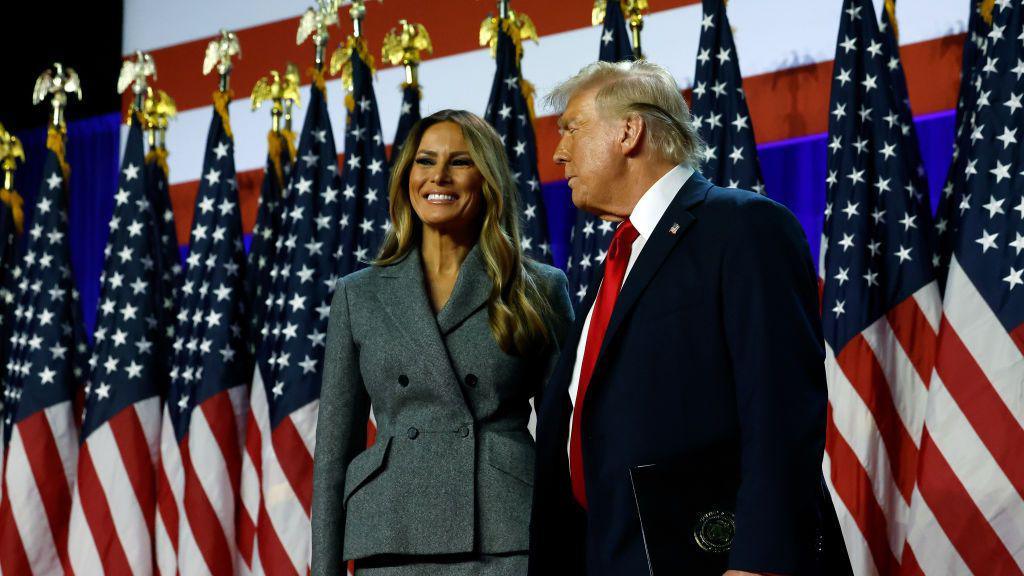
Mrs Trump appeared smiling by her husband's side on Election Night, shortly before he declared victory
Mrs Trump did appear on key occasions, like when her husband announced in late 2022 that he would be running again.
She also attended the Republican National Convention in July wearing a bright red Christian Dior suit, but did not deliver a speech - another break from tradition.
When she does speak, her words appear carefully chosen, offering hints to her point of view.
At her husband’s Madison Square Garden rally just weeks before Election Day, she delivered short but pointed remarks in line with the Trump campaign's law and order messaging, painting New York City as a “great metropolis” in decline due to rampant crime.
She also spoke after the first assassination attempt on her husband, calling for unity and labelling the perpetrator a “monster”.
In a rare interview on Fox, she later accused his political opponents and the media of “fuelling a toxic atmosphere” that led to the attack.
Mrs Trump declared her pro-choice stance in her recent memoir, putting her at odds with anti-abortion activists within the Republican Party - though the remarks prompted speculation due to their timing, as her husband was struggling to campaign on the issue after the overturning of Roe v Wade.
Mrs Trump wrote about her modelling career, her admiration for her husband and their past political disagreements, but chose to keep details of those disputes private.
She has, however, publicly stood by Trump on controversial stances like his false claim that the 2020 presidential election was stolen.
"I am not the only person who questions the results," she wrote in her book. On the Capitol Riots on 6 January, 2021, she wrote that she "wasn't aware" of what was taking place because she was preoccupied with her duties.
Her former press secretary, Stephanie Grisham, wrote in her own memoir that Mrs Trump refused to issue a statement condemning the violence, leading Ms Grisham to resign.
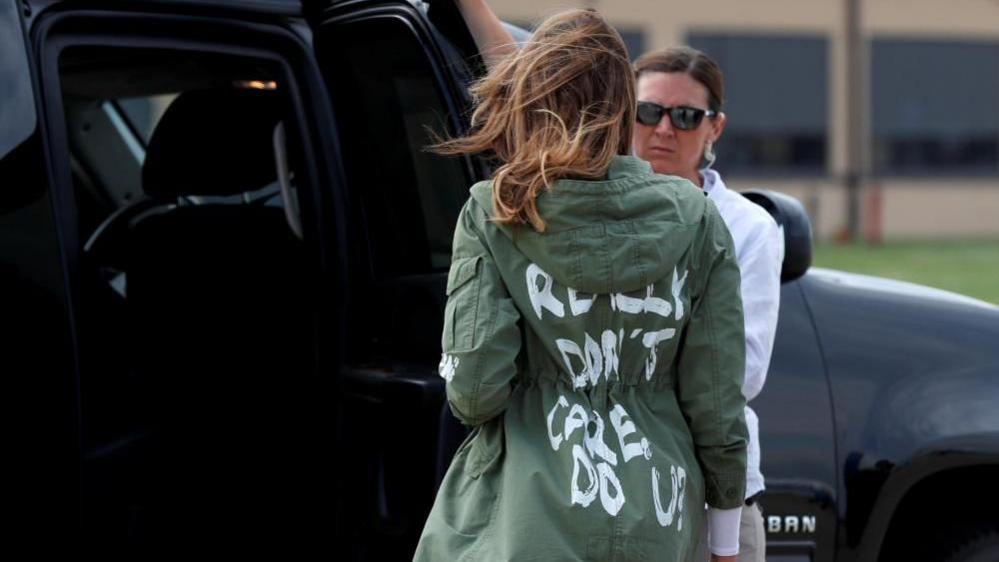
A jacket worn by Mrs Trump that reads "I really don't care, do you?" while she was first lady generated controversy
Some commentators have questioned whether she enjoyed the role of first lady at all.
One of her biographers, former CNN reporter Kate Bennett, maintains she did despite her early reluctance.
“She liked all the accoutrements that go with being first lady and living in the White House,” Ms Bennett told People magazine in 2021. “I think she actually really enjoyed it.”
In her memoir, Mrs Trump wrote that she has a “strong sense of duty to use the platform as First Lady for good”.
And she said in a 1999 interview that if her then-boyfriend Trump ever ran for president, she would use former first ladies Jacqueline Kennedy and Betty Ford as role models, calling them "very traditional".
Mrs Kennedy was a fashion icon who was dedicated to the preservation of the White House, while Mrs Ford was known as a trailblazer who advocated for abortion rights and women's rights.
After relocating to Washington, Mrs Trump started taking on first lady duties, such as hosting luncheons and state dinners for visiting world leaders. She also focused on White House aesthetics, ordering extensive renovations and overseeing ambitious Christmas decorations (and was once secretly recorded complaining about that last task).
Her clothing was the subject of media fascination and controversy, particularly after she was spotted wearing a jacket with the phrase “I really don’t care, do you?” during a trip to a migrant child detention centre in 2018.
She said the jacket was a message for “the people and the left-wing media” who were criticising her.
Mrs Trump came under fire again after being secretly recorded by her former friend and senior advisor. She was heard expressing her frustration at being criticised for her husband’s policy to separate migrant children from their families.
She later revealed that she had been blindsided by the policy, and had told Trump privately that she did not support it. The policy was dropped by the president in June 2018 after a firestorm of controversy.
Prof Vigil says one of the biggest challenges that Mrs Trump faced in her first term was her political inexperience as well as a revolving door of staff, who were equally inexperienced and at times disloyal.
But Mrs Trump kept quietly busy regardless, Prof Vigil adds, advocating for issues like children’s welfare through her Be Best campaign against online bullying.
She was forced to defend that campaign given her own husband's aggressive use of social media, telling CBS in 2016, external that how he conducted himself online got him in trouble - and boosted his followers.
She also advocated for children affected by the opioid crisis, and has since started a foundation that raises education funds for children in foster care.
Many expect for that work to continue once she moves back to Washington, though it remains unclear if she will live there full-time.
Speaking to Fox after her husband's second win in November, Mrs Trump said she has been busy preparing her return to the role of First Lady.
"I am establishing my transition team, and also working on my office," she said, adding that this time, she knows what to expect and her aim is to be ready on day one.
She has been spotted a few times at Mar-A-Lago - where much of the work on Trump's transition team is taking place - including hosting Mrs Akie Abe, widow of the late former Japanese Prime Minister Shinzo Abe, in December.
Prof Vigil says the role of first lady has evolved over the years and Mrs Trump will "make choices about how active in public she wants to be".
"And I think she'll do that much more intentionally."
- Published6 November 2024
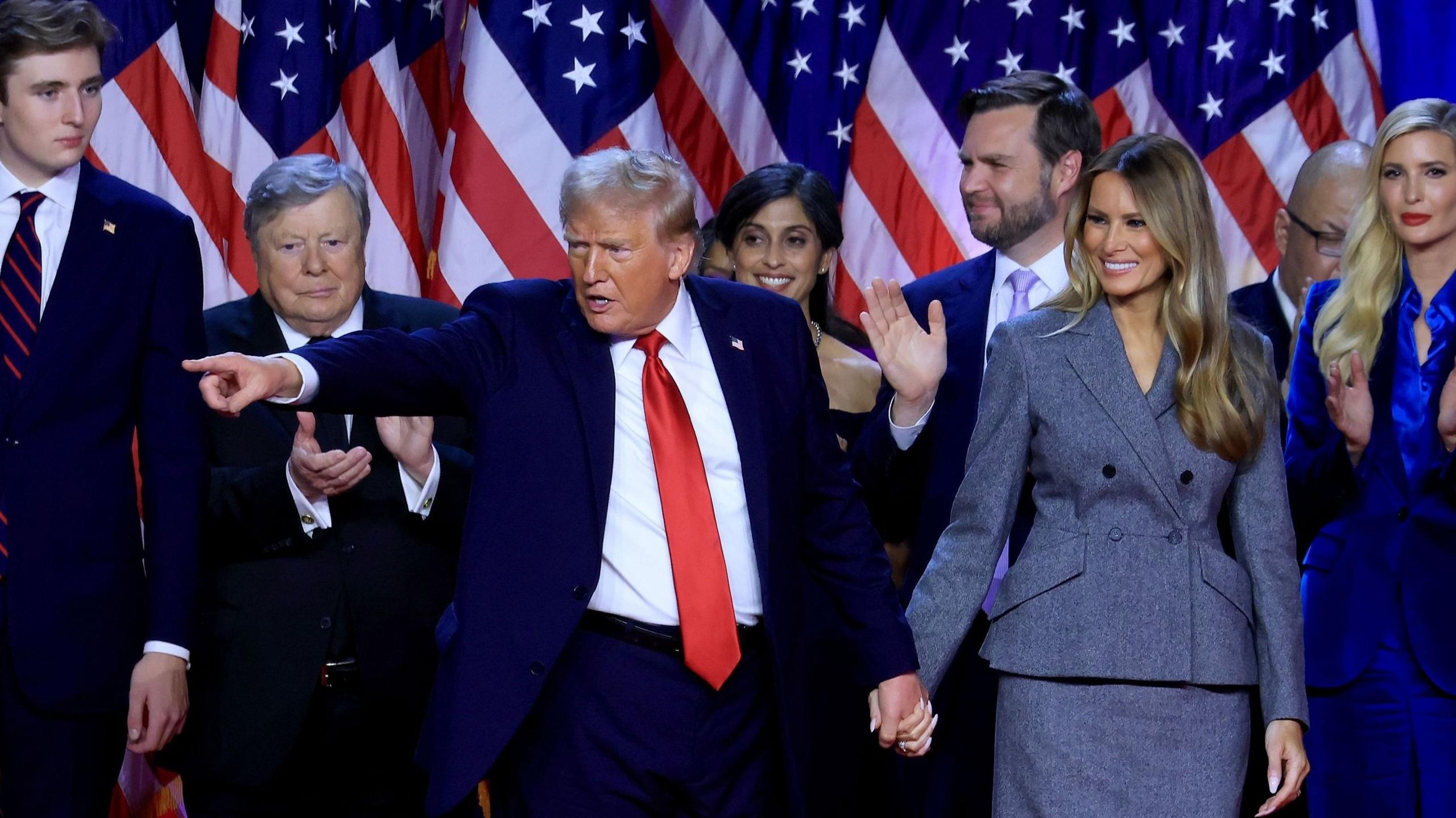
- Published7 November 2024
